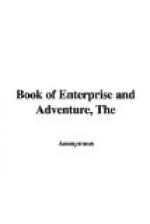HORRORS OF AFRICAN WARFARE.
There appears to be a wild caprice amongst the institutions; if such they may be called, of all these tropical nations. In a neighbouring state to that of Abyssinia, the king, when appointed to the regal dignity, retires into an island, and is never again visible to the eyes of men but once—when his ministers come to strangle him; for it may not be that the proud monarch of Behr should die a natural death. No men, with this fatal exception, are ever allowed even to set foot upon the island, which is guarded by a band of Amazons. In another border country, called Habeesh, the monarch is dignified with the title of Tiger. He was formerly Malek of Shendy, when it was invaded by Ismael Pasha, and was even then designated by this fierce cognomen. Ismael, Mehemet Ali’s second son, advanced through Nubia claiming tribute and submission from all the tribes Nemmir (which signifies Tiger), the king of Shendy, received him hospitably, as Mahmoud, our dragoman, informed us, and, when he was seated in his tent, waited on him to learn his pleasure. “My pleasure is,” replied the invader, “that you forthwith furnish me with slaves, cattle, and money, to the value of 100,000 dollars.”—“Pooh!” said Nemmir, “you jest; all my country could not produce what you require in one hundred moons.”—“Ha! Wallah!” was the young Pasha’s reply, and he struck the Tiger across the face with his pipe. If he had done so to his namesake of the jungle, the insult could not have roused fiercer feelings of revenge, but the human animal did not shew his wrath at once. “It is well,” he replied; “let the Pasha rest; to-morrow he shall have nothing more to ask.” The Egyptian, and the few Mameluke officers of his staff, were tranquilly smoking towards evening, entertained by some dancing-girls, whom the Tiger had sent to amuse them; when they observed that a huge pile of dried stalks of Indian corn was rising rapidly round the tent. “What means this?” inquired Ismael angrily; “am not I Pasha?”—“It is but forage for your highness’s horses,” replied the Nubian; “for, were your troops once arrived, the people would fear to approach the camp.” Suddenly the space is filled with smoke, the tent-curtains shrivel up in flames, and the Pasha and his comrades find themselves encircled in what they well know is their funeral pyre. Vainly the invader implores mercy, and assures the Tiger of his warm regard for him and all his family; vainly he endeavours to break




